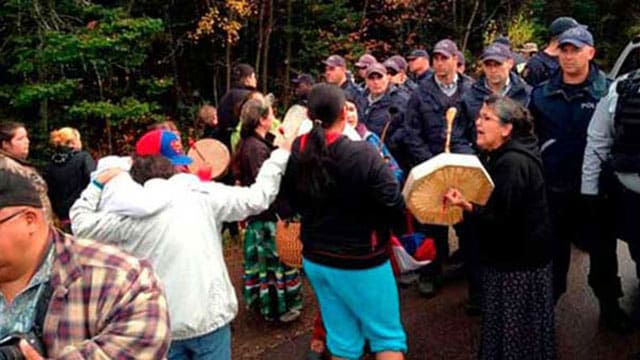Perhaps the answer lies with UNDRIP and the rejection of the “illegitimate” Canadian state
By Geoffrey Moyse
In her Minister’s Statement on Mining Month 2023, the BC NDP Minister of Energy, Mines and Low-Carbon Innovation, Josie Osbourne, said:
“First Nations have a crucial role in British Columbia’s mining sector. Our approach to natural-resource development must be done in collaboration and partnership with the rightful owners of the land.” (Emphasis mine)
Was the Minister referring to unproven Aboriginal title lands under Canadian law, or rather, was she really expressing the views of her government that Indigenous people are, in fact, the “rightful owners” of the entirety of British Columbia?
Left-leaning governments in Canada and elsewhere vehemently decry and oppose “colonialism” in all its forms and embrace a political view of non-Indigenous people as mere “settlers” or even trespassers on “Indigenous lands”.
 |
| Related Stories |
| BC government sidesteps public, courts in radical reconciliation efforts
|
| BC’s plan for Aboriginal land claims lacks democratic legitimacy
|
| Keep an Eye on BC |
The term “settler,” as we are fully aware from the Palestinian/Israeli debate raging in Canada’s universities and elsewhere, is now being used by various champions of “social justice” in our society as a totally pejorative term, even in classrooms.
Canada is, according to this narrative, an illegitimate country built entirely on “stolen” Indigenous lands. Correspondingly, all “non-Indigenous” people who now live in Canada – and apparently particularly in British Columbia – are just illegitimate “squatters” who owe their continuing presence here to the dignified sufferance of the “rightful owners of the land.”
Is it possible that this view of the fundamental illegitimacy of the Canadian state and its provinces is why the BC NDP is so keen to embrace and relentlessly attempt to implement UNDRIP (United Nations Declaration on the Rights of Indigenous Peoples) rather than fully engaging the broader public on fundamental matters of Indigenous reconciliation through the lens of Canadian law?
Article 26 of UNDRIP reveals that there is no definition of traditional Indigenous territory other than what Indigenous peoples traditionally have viewed as their territories. That would certainly cover more than 100 percent of BC’s entire land base.
Subsection 2 of that article confirms their outright ownership of all such lands and the resources found on them.
Is it a mere coincidence that the present BC government likes to refer to the “rightful owners of the land” without any reference to Canadian law – which happens to say something very different about Aboriginal title under the Canadian constitution?
It is more likely quite deliberate and explains why this government feels the need to exclude the views of non-Indigenous British Columbians in its pursuit of its own views on what constitutes true reconciliation.
So how can the present BC government successfully undermine “colonialism” and recognize underlying Indigenous ownership of the entirety of the province while keeping its own appearance of democratic legitimacy?
The answer lies in Article 32(2) of UNDRIP.
Article 32(2) provides that nothing should happen on Indigenous territory, as referenced in Article 26, without “free, prior and informed Indigenous consent.”
This is how the present provincial government can undermine colonization and work step by step to recognize the “authority” of those “rightful owners” to ultimately determine what they will and will not tolerate occurring on “their” lands – e.g. the entirety of the British Columbia land base.
This is the real purpose behind the BC Declaration on the Rights of Indigenous Peoples Act and the now infamous section 7 of that legislation, which created the recent firestorm of public discontent about proposed changes to the Land Act that would have provided for Indigenous consent before the government could act.
If Canadian law is unwilling to recognize the view that Indigenous people are the rightful owners of all lands in this province, then as a virtue-signalling provincial government, why not ignore the “colonial” views of the Canadian courts and fully embrace Indigenous consent to ensure that all land use by non-Indigenous British Columbians throughout the province has the approval of the “rightful owners of the land”?
If control of the provincial land base is effectively transferred to its Indigenous populace, then the “illegitimate” colonial structure that currently underpins British Columbia society can finally be thoroughly discredited in the name of “social justice.”
The “dream” of decolonization is finally within reach: perhaps one more term of NDP government in British Columbia will be enough to bring it to fruition …
Geoffrey S. Moyse KC is a retired senior lawyer who served as legal counsel to the Province of BC, advising six successive governments on Aboriginal law over 30 years.
For interview requests, click here.
The opinions expressed by our columnists and contributors are theirs alone and do not inherently or expressly reflect the views of our publication.
© Troy Media
Troy Media is an editorial content provider to media outlets and its own hosted community news outlets across Canada.

